Just as a quick update. We know many folks were excited about the Lenovo Vendor Locking Ryzen-based Systems with AMD PSB piece we did. After completing that piece, we now have several systems set up to validate this in other platforms that we test. As we were working on the Lenovo ThinkCentre M75q Tiny Gen2 35W AMD Ryzen 5000 piece where we found the PSB vendor-locking, we also started work on an HP EliteDesk 805 G6 Mini. That is where we were able to test using our new setup.
Testing an HP EliteDesk 805 G6 AMD Ryzen Pro PSB Status
For a quick background, Lenovo is vendor-locking AMD Ryzen Pro CPUs using a feature called AMD PSB, or Platform Secure Boot. While we have seen Dell EMC and Lenovo use it in the AMD EPYC line, and Lenovo use it in the EPYC-derived Threadripper Pro line previously, this was the first time we found it in the 1L corporate desktop PCs. Specifically, we found it on the Lenovo ThinkCentre M75q Tiny Gen2.
The question being asked at that point was “which other vendors are using PSB?” Dell, for its part, does not really have many AMD Ryzen Pro series OptiPlex systems. That is a shame since the Ryzen 4000 and Ryzen 5000 series systems are very good, especially in the 35W TDP 1L form factor.
HP has been a struggle. We have two HP EliteDesk 805 G8 Mini systems on order and have had them ordered for over a month. While HP’s website for the same configurations lists only a few weeks for delivery, our units now have a March ETA. Let us be clear, what HP is doing is dastardly. HP charged us in early January. It knows that it cannot produce the boxes on the timeline suggested on the ordering page because our exact same configurations have earlier ETAs on the HP online order portal. This is a dastardly business practice by HP because it knows its estimated ship dates are not real yet uses dates it knows are untrue to take funds from customers. Still, we are going to look at the technical merits of HP and AMD PSB here.
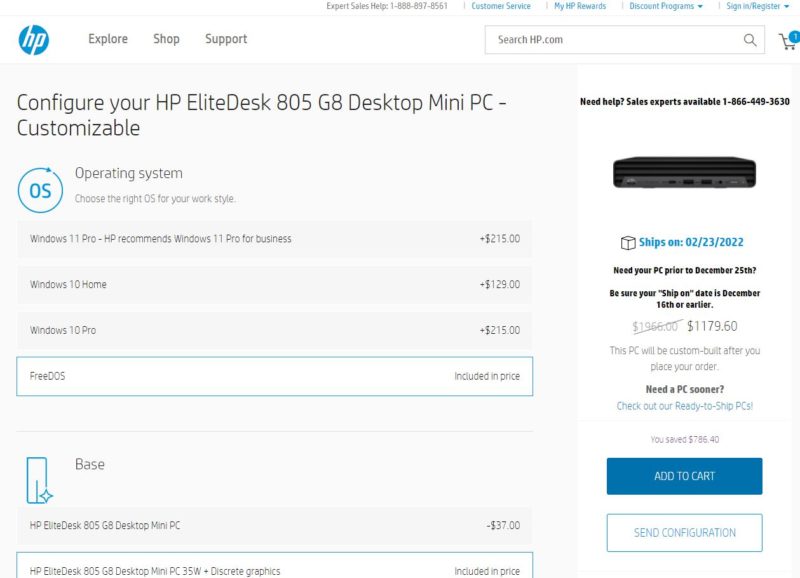
Even though ordering via HP is a challenge, we were able to get an EliteDesk 800 G6 Mini via eBay and a STH YouTube viewer Jose. We will have the full review of this unit in the not-too-distant future (it is in Alex’s editing queue.)
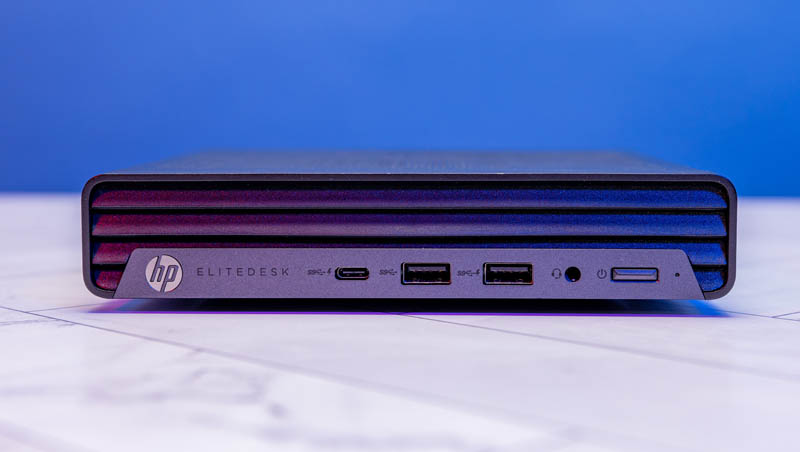
Since this is an important industry topic, we wanted to test if this AMD Ryzen Pro 4000 series HP EliteDesk also used AMD PSB vendor-locking like Lenovo’s competitive line.
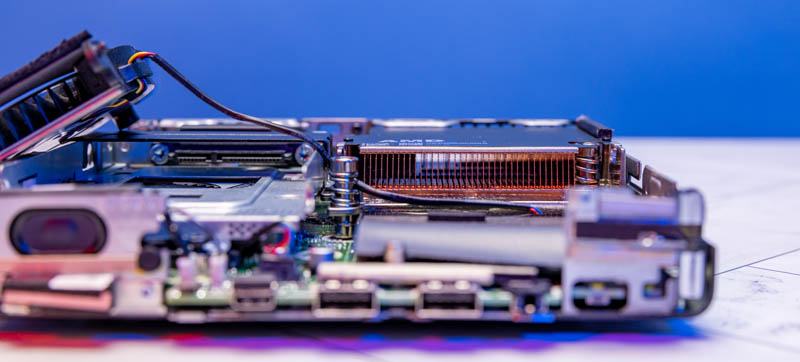
For this effort, we used three motherboards from the enthusiast space. You will see small overview vignettes of them on STH in the coming weeks since Eric has already finished the short pieces on them. The first was an ASUS ROG STRIX B550-I Gaming mITX platform in a compact InWin B1 chassis.
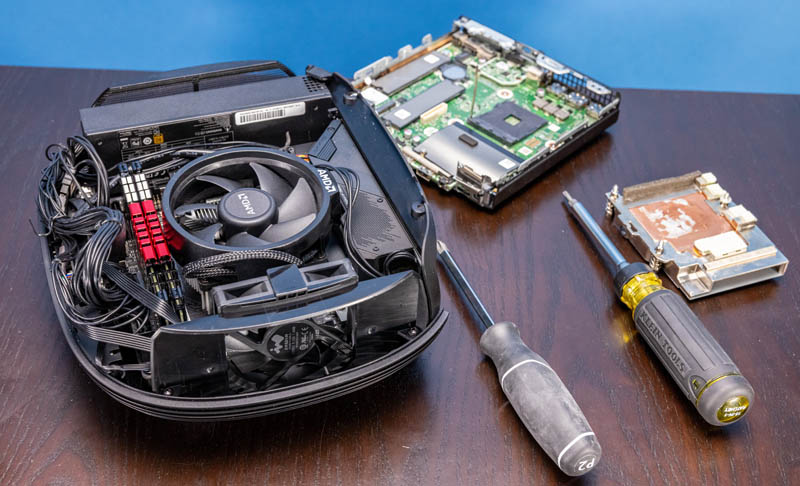
We also used the ASUS TUF GAMING B550M-Plus WiFi as a non-mITX control. This was one we probably could have done without, but it arrived before the mITX ASUS platform and came along with the AMD Ryzen 7 5700G that we used as a control CPU to make sure it works in the systems from ASUS and Gigabyte.
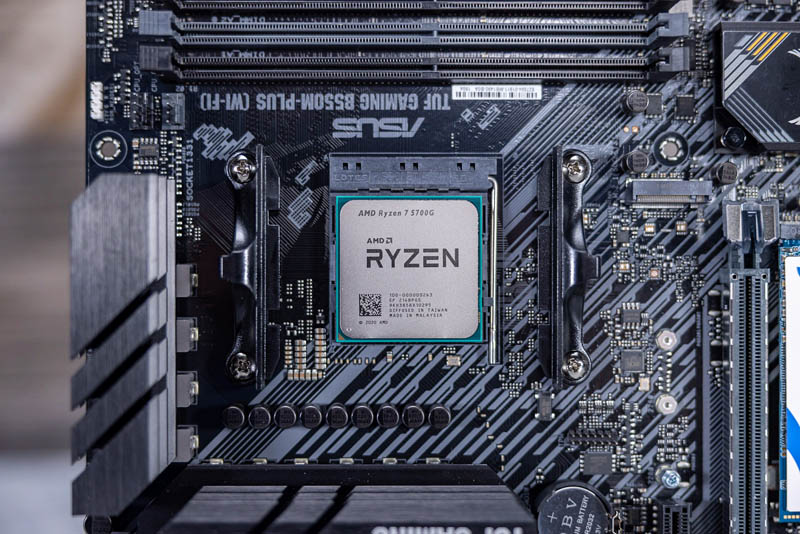
To ensure we were not validating solely with ASUS and the B550 chipset, we also got a Gigabyte X570 I Aorus Pro WiFi unit.
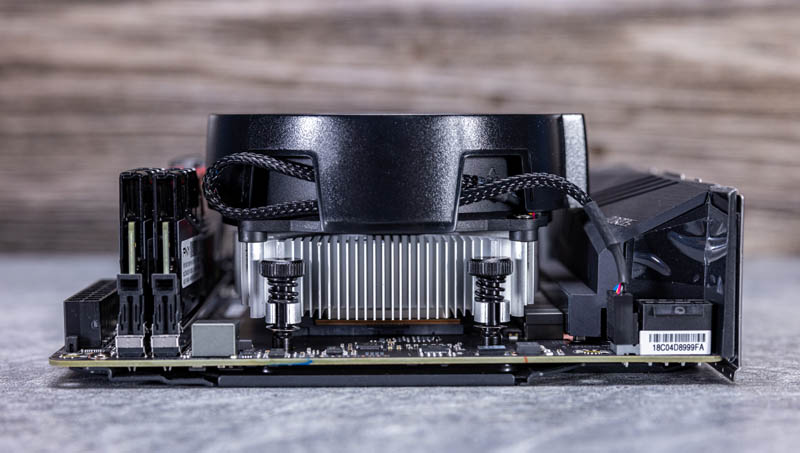
With this, we had three motherboards, two chipsets, and two vendors to test with, along with a Ryzen CPU that also had onboard graphics.
Testing the HP EliteDesk 800 G6 Mini CPU
This is a bit repetitive to show what happened, but in all three platforms, we saw the systems boot with the AMD Ryzen 7 Pro 4750GE from the EliteDesk 800 G6 Mini:
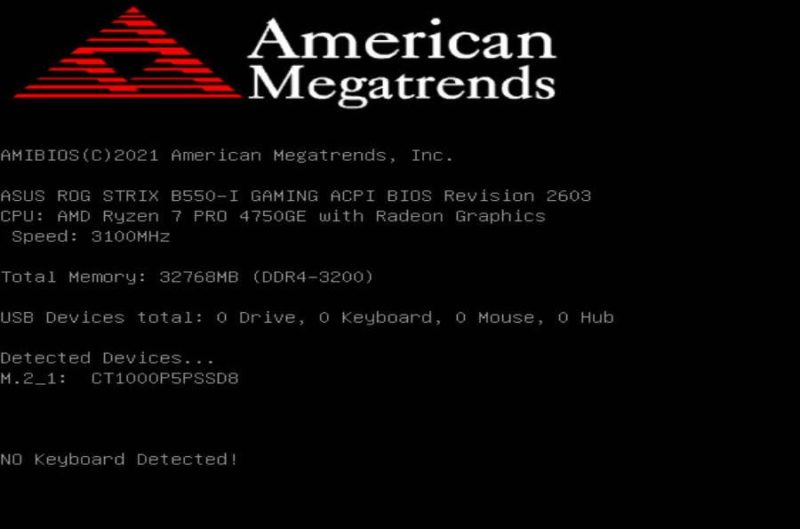
Everything worked as we would have expected. Something we did not see in the firmware for either Gigabyte or ASUS was a PSB feature.
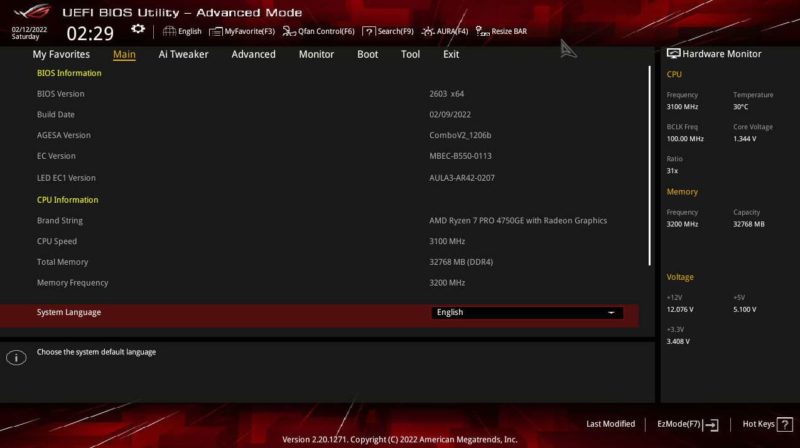
Here is the system logging into the Proxmox VE OS installer on the test ASUS/InWin platform above.
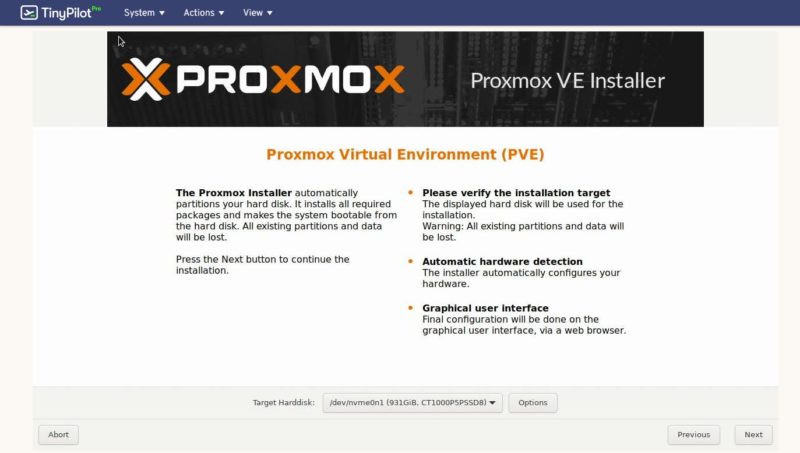
As a quick note, ASUS fared better than Gigabyte with TinyPilot Voyager compatibility.
Final Words
Based on our sample of a single unit, it does not seem like HP is vendor-locking its AMD Ryzen Pro CPUs. Dell for its part does not have a competitive product (but does use PSB on its EPYC servers.) That leaves only Lenovo using AMD PSB for CPU vendor locking. As we have mentioned previously, it is up to the system OEM to decide if they want to enable AMD PSB at the factory. The reason to do so is to ensure that there is no tampering between the factory and the customer.
Now for the bad news, if you are trying to get a HP EliteDesk 800 G6/G8 Mini from HP, the HP online shop is misleading consumers with estimated ship dates. We have orders in for two different configurations, we have contacted the HP PCE team, and HP is quoting dates on its website it knows it will not make.
So the plus side is that HP is not vendor-locking the G6 generation’s processors. The negative is that it is hard or impossible to get the HP EliteDesk 805 G8 Mini right now from HP. As soon as we get one, we now have the test apparatus in place to see if HP is using PSB in that generation. Otherwise, we will just turn to the secondary market and procure one.

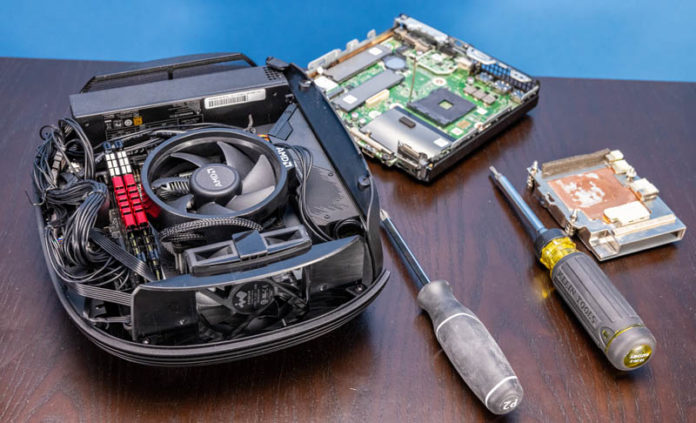
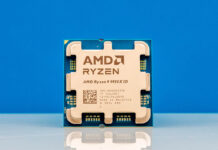

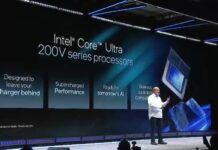
What HP’s doing is illegal in California and they’re for sure doing business there.
I purchased an ASRock Desk Mini X300 and that was Advertised a being out of the Box ready for Ryzen 4000G Processors(Consumers usually get the non Pro Branded Variants) but AMD never released any of the Non Pro Branded 4000G series APUs to the DIY market and I felt cheated there because of ASRock’s/AMD’s marketing. I still to this day think that ASRock and AMD should have released some Ryzen 4000G series APUs(Non pro variants that can be Processor Overclocked) to the consumer/DIY market even though there are now Ryzen 5000G series Processors available! And that’s because I actually try and get Trailing Edge processor generations for their value preposition once the next generation arrives and the old leading edge becomes trailing edge and on sale at Microcenter for clearance pricing.
I do Know that there is a gray market for Ryzen 4000G Pro/OEM Parts but that usually comes sans any warranty as those are not Packaged for Processor In Box retail sales to consumers and the Pro Branded APUs are processor locked to make that Pro Warranty period. But AMD and ASRock should have made it Known that AMD had no plans to release any Ryzen 4000G series APUs to the consumer/DIY market rather than have customers purchase that SKU(Desk Mini X300) from ASRock unknowing that there would be no Ryzen 4000G APUs available for Retail Purchase outside of OEM SKUs.
But Have you seen the Ryzen 6000 series APUs that are Zen-3+ and come with RDNA2 integrated graphics and I do hope that AMD releases some non BGA/AM5 variants of the 6000 series(6000G/6000GE) as Socketed Desktop APUs as that integrated RDNA2 graphics is rather powerful and obviates the need for a low end discrete mobile GPU.
I’d like to see more coverage of Ryzen 6000/Zen-3+ parts in the future as hopefully the OEMs will be including the Full USB-4 Feature Level support that Includes the Thunderbolt-3 Protocol and 20Gbs/40Gbs(Active TB Cable) bandwidth. But consumers better keep an eye on the OEMs and that USB-4 labeling requirement that does not necessarily assume that any USB-4 capable port has to include any TB3 connectivity.
I’d want to see Ryzen 6000G too
I don’t know how people order HP direct. Their website is a hot mess, and has been a hot mess for years. No matter where you order, they (at least recently) tie firmware updates to their support contract, so firmware security fixes cost money. And I reiterate again, their website is a hot mess. Honestly, I’m just impressed Patrick was able to configure and order a system.
One can reasonably argue that HP, SuperMicro, Lenovo, etc have major flaws. Yes, that’s true. But it’s like HP is desperate to avoid any SMB business, direct or from VARs.
Very glad to read that HP does not appear to be vendor-locking CPUs. What an abhorrent practice–shame on Lenovo.
@ssnseawolf: Agree that HP’s websites are… sub-optimal, and have been for as long as I remember. But in contrast to your experience, I’ve been pleased with their firmware support for their Z series workstations. Yes, you can enter in your systems’ serial numbers and they’ll show you available updates. But you don’t have to: you can just enter your system and OS and frequently-updated firmware is there. Along with firmware history with changelogs. Much better than I’ve found with Lenovo, which I now try to avoid for that reason alone.
@FM that’s good to know, perhaps I was too hard on HP. Changelogs are certainly a sell.
Curious if you have insight into HP still tying firmware updates to their support contract, though. Or perhaps it’s only for certain rack systems/product lines?
What I really don’t understand is, why isn’t this an option default to an opt-in of PSB locking when you order?
It’s good that HP doesn’t PSB lock their CPU, but it should not be a reason to give them your money. Being an ex field tech for them I know first hand how crap their whole hardware manufacturing and warranty is. The amount of parts I was given for the same job that either where not the right ones or just where not working at all made me hate this job and the company, enough to give my first comment here!
Curious to know if a 5700g will work on an HP elitedesk 805 G6? Thanks in advance!
Same here. Curious if ryzen 5700G will work on HP 805 G6 or not.